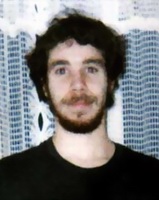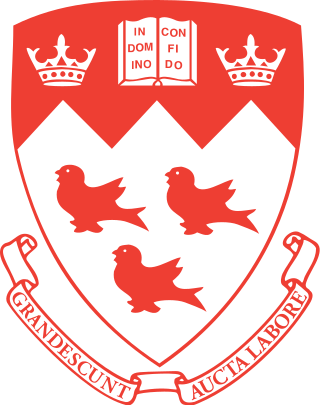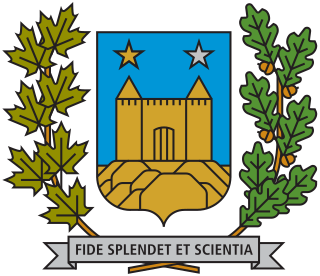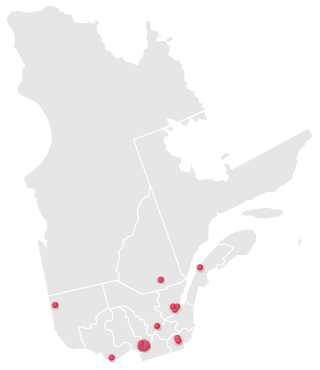
The École Polytechnique massacre, also known as the Montreal massacre, was an antifeminist mass shooting that occurred on December 6, 1989, at the École Polytechnique de Montréal in Montreal, Quebec, Canada. Fourteen women were murdered; another ten women and four men were injured. The perpetrator was 25-year-old Marc Lépine, armed with a legally obtained Ruger Mini-14, 30-round high-capacity magazines, and a hunting knife. He began his rampage at a mechanical engineering class at the École Polytechnique, where he separated the male and female students, ordering the men to leave. He shot all nine women in the room, killing six. For nearly 20 minutes the shooter moved through corridors on multiple floors of the building, the cafeteria, and another classroom, targeting women. He wounded more students and killed eight more women before fatally shooting himself.

The Université du Québec à Montréal, is a French-language public research university based in Montreal, Quebec, Canada. It is the largest constituent element of the Université du Québec system.

Polytechnique Montréal is a public research university affiliated with the Université de Montréal in Montreal, Quebec, Canada. The school offers graduate and postgraduate training, and is very active in research. Following tradition, new Bachelors of Engineering (B.Eng) graduating from Polytechnique Montréal receive an Iron Ring, during the Canadian Ritual of the Calling of an Engineer ceremony.

Marc Lépine was a Canadian mass murderer from Montreal, Quebec. On December 6, 1989, he murdered fourteen women and wounded another ten women and four men in what is known as the École Polytechnique massacre. It took place at the École Polytechnique de Montréal, an engineering school affiliated with the Université de Montréal.
Seymour Schulich is a Canadian businessman, investor, author, and philanthropist.

McGill University is an English-language public research University located in Montreal, Quebec, Canada. Founded in 1821 by royal charter, the university bears the name of James McGill, a Scottish merchant, whose bequest in 1813 established the University of McGill College. In 1885, the name was officially changed to McGill University.

The Faculty of Engineering is one of the constituent faculties of McGill University in Montreal, Quebec, Canada, offering undergraduate and graduate degrees in bio-engineering, bioresource, chemical, civil, computer, electrical, mechanical, materials, mining, and software engineering. The faculty also comprises the School of Architecture and the School of Urban Planning, and teaches courses in bio-resource engineering and biomedical engineering at the master's level.

The University of Montreal is a French-language public research university in Montreal, Quebec, Canada. The university's main campus is located in the Côte-des-Neiges neighborhood of Côte-des-Neiges–Notre-Dame-de-Grâce on Mount Royal near the Outremont Summit, in the borough of Outremont. The institution comprises thirteen faculties, more than sixty departments and two affiliated schools: the Polytechnique Montréal and HEC Montréal. It offers more than 650 undergraduate programmes and graduate programmes, including 71 doctoral programmes.

The School of Computer Science is an academic department in the Faculty of Science at McGill University in Montreal, Quebec, Canada. The School is the second most funded computer science department in Canada. As of 2024, it has 46 faculty members, 60 Ph.D. students and 100 Master's students.

Higher education in Quebec differs from the education system of other provinces in Canada. Instead of entering university or college directly from high school, students in Quebec leave secondary school after Grade 11, and enter post-secondary studies at the college level, as a prerequisite to university. Although both public colleges (CEGEPs) and private colleges exist, both are colloquially termed CEGEPs. This level of post-secondary education allows students to choose either a vocational path or a more academic path.

Polytechnique is a 2009 Canadian drama film directed by Denis Villeneuve and written by Villeneuve and Jacques Davidts. Starring Maxim Gaudette, Sebastien Huberdeau, and Karine Vanasse, the film is based on the 1989 École Polytechnique massacre and re-enacts the events of the incident through the eyes of two students who witness a gunman (Gaudette) murder fourteen young women.

David Saint-Jacques is a Canadian astronaut with the Canadian Space Agency (CSA). He is also an astrophysicist, engineer, and a physician.
The Fédération étudiante universitaire du Québec was a federation of university students' unions created following the lifting of the tuition freeze in 1989. It included 9 member associations, which represent more than 71 000 Quebec university students. The federation dissolved in March 2015.

Victoria Michelle Kaspi is a Canadian astrophysicist and a professor at McGill University. Her research primarily concerns neutron stars and pulsars.
Basil D. Favis is a full professor in Department of Chemical Engineering, Ecole Polytechnique de Montreal and the director of Center for Research on High Performance Polymer and Composite Systems (CREPEC). Favis is the author or co-author of more than 170 scientific papers and is one of the most highly cited authors in the polymer/biopolymer blends field. In 1995 Favis was the recipient of the Syncrude Canada Innovation Award of the Canadian Society for Chemical Engineering. He is the past chairman of the Macromolecular Science and Engineering Division of the Chemical Institute of Canada, a Fellow of the Chemical Institute of Canada, a Fellow of the Society of Plastics Engineers, a member of the Quebec Order of Engineers and in 1997-1998 was the Invited Professor at the University of Strasbourg in France.
Roland Doré, spent his career at the École Polytechnique de Montréal as professor, director general and as chairman of the board of directors. He is a former president of the Canadian Space Agency from 1992 to 1994 then President of the International Space University in Strasbourg, France from 1994 to 1998. In 2001, Doré received the Officer of the Order of Canada, Knight of the National Order of Quebec in 2010 and honorary doctorates from Concordia University and McGill University, Royal Military College Saint-Jean and Royal Military College of Canada.

Pierre Lassonde is a Canadian businessman and philanthropist.
Jacques Rousseau Award is an award given by the Association francophone pour le savoir (ACFAS) to an individual or group who develop bridges between scientific disciplines. The award is named for Jacques Rousseau who was both a botanist and an anthropologist. He was a former secretary of the ACFAS.

Michèle Thibodeau-DeGuire is a Canadian engineer born in Montreal, Quebec in 1941. The first woman to earn a degree in civil engineering, she was inducted into the Order of Canada in 2003, and made a Knight of the National Order of Quebec in 2005. She has been chair of the Board of Directors of the Corporation of École Polytechnique de Montréal since 2013.
The Office for Science and Society (OSS) is an organization dedicated to science education, operating from Montreal's McGill University. Its staff and contributors use courses, mass media, special events and books to debunk pseudo-scientific myths and improve scientific literacy.














